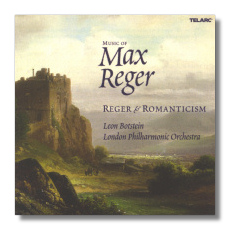
The Internet's Premier Classical Music Source
Related Links
- Reger Reviews
- Latest Reviews
- More Reviews
-
By Composer
-
Collections
DVD & Blu-ray
Books
Concert Reviews
Articles/Interviews
Software
Audio
Search Amazon
Recommended Links
Site News
 CD Review
CD Review
Max Reger

- Four Tone Poems after Arnold Böcklin, Op. 128
- An die Hoffnung (To Hope) for Mezzo-soprano & Orchestra, Op. 124
- A Romantic Suite, Op. 125
London Philharmonic Orchestra/Leon Botstein
Catherine Wyn-Rogers, mezzo-soprano
Telarc CD-80589 DDD 64:47
The music of Max Reger always has been more popular in Europe than in the United States, and so it is good to see (and hear) an American conductor making such a positive case for it on an American record label. The subtitle to this CD is "Reger & Romanticism." Although Reger's death in 1916 places him somewhat outside the era of true Romanticism, his devotion to art and literature, as well as to music, made him a Romantic deep down. (These late works date from 1912-13.)
That devotion is unequivocally expressed in the Four Tone Poems after Arnold Böcklin. Böcklin was a Swiss painter whose favorite subjects were the fantastic and the morbid. Reger's short tone poems correspond to four Böcklin canvases. The first represents a devoutly fiddling hermit being watched – unbeknownst to him – by three curious cherubs. The second is an ocean scene, with dismayed Nereids intruded upon by randy swimming Centaurs. In the third, a coffin is borne to the eternally silent Isle of the Dead. (Rachmaninoff was inspired by this painting in his work of the same name.) The closing "Bacchanale" has been described as a German beer festival in ancient Roman dress. Telarc reproduces the four paintings in its booklet, but it is almost impossible to discern any detail in the tiny reproductions. Reger rejects the obvious – rightly, I feel – in favor of more generalized pictorialism. The opening "Fiddling Hermit" is most moving, and in the third section, it is interesting to see how much Reger anticipates moods accessed by Rachmaninoff.
The other two works are less familiar. An die Hoffnung is an extended orchestral song, almost ten minutes in length. The text is by arch-Romantic poet Friedrich Hölderlin. Both the text and Reger's setting of the same look back to Brahms' Alto Rhapsody and forward to Richard Strauss' Four Last Songs. Mezzo Catherine Wyn-Rogers sings it richly, like the ripe fruit that it is.
The Romantic Suite is based on the work of another Romantic poet, J.F. Eichendorff. It has been proposed that this work – a Notturno, a Scherzo, and a Finale – is a symphony without a first movement (Bruckner's Ninth in reverse, one might say), although it is self-sufficient as it stands. Like the other two works on this disc, the absence of striking melody is offset by heady atmosphere and superior craftsmanship, particularly in the scoring. Reger, thanks to his experience as a conductor, was a master of orchestral sound. Among Germans of his era, he had a few peers, and hearing a work such as the Romantic Suite puts one in mind more of Franck than of Reger's near contemporary Richard Strauss.
Botstein conducts this music warmly and with loving patience. In the Böcklin Tone Poems, he is more emotionally involved than Neeme Järvi was on his Royal Concertgebouw Orchestra recording (Chandos CHAN8794). The London Philharmonic does itself proud, and Telarc's engineering complements the warmth and richness of Reger's music. I'd be pleased if these forces recorded more Reger – perhaps the Hiller Variations and the Mozart Variations.
Copyright © 2002, Raymond Tuttle




















